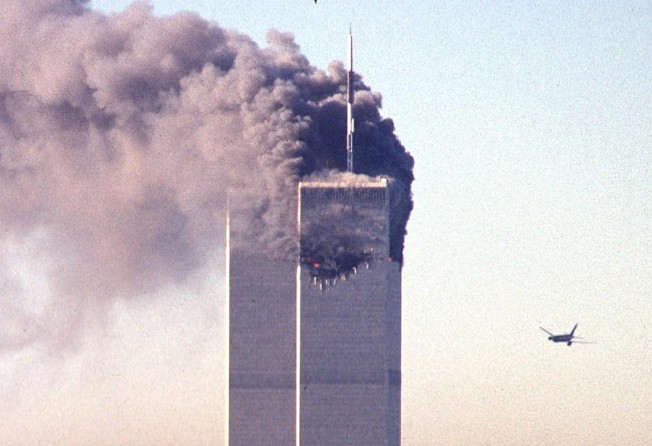In a world no safer 20 years on, rivalries must be put aside to meet terror threat
- September 11 unleashed the ‘war on terror’, but after conflicts in Afghanistan, Iraq and Syria, Islamist groups such as Isis thrive and the bombings, knife attacks and other atrocities go on

No matter what our nationality or political persuasion, the terrorism in the United States on September 11, 2001, will remain etched in memory for those who lived through it.
Two hijacked passenger planes turned the twin towers of New York’s iconic 110-storey World Trade Center into smouldering piles of rubble, another jet slammed into the Pentagon in Washington and a fourth aircraft, believed bound for the seat of political power, the Capitol, nosedived into a field in Pennsylvania. More than 3,000 people died that day and the global hunt for the masterminds of the worst crime on American soil began.
On this anniversary 20 years later, the world is much changed, having been redefined by wars in Afghanistan, Iraq and Syria, attacks by Muslim extremists in the West, China and elsewhere in Asia, heightened security in public places and the radicalisation of disaffected people by groups like Islamic State (Isis) that continue to threaten stability.
The subsequent changes to everyday life are everywhere. Surveillance in public places is now commonplace and police and intelligence agencies have wide powers. Air travel has been altered dramatically, with extensive identity, body and luggage checks and limits to what can be taken on board planes. But for all that, extremism is no less a threat to security and stability.
Spate of bombings
US intelligence had failed to prevent the September 11 plot by 19 members of the al-Qaeda Islamist group. Afghanistan was identified as the base from which the attacks had come and within weeks, war had been declared and the hardline Islamic Taliban government blamed for harbouring the extremists ousted.
Iraq and its president, Saddam Hussein, were next seen as a threat and in 2003, there was another invasion and leader toppled. Only in 2011 was the hideout of al-Qaeda’s founder, Osama bin Laden, located in Pakistan and it was assumed that with his death in a raid by US special forces, the global spate of bombings, knife attacks and other atrocities that had been unleashed would subside.
Many of the attacks had been on soft Western targets; among them were holidaymakers in Bali in 2002, a train in Madrid in 2004, and public transport in London in 2005. But bin Laden’s death did not stem the tide of terror; American miscalculations and more intelligence failures spurred the global rise of Islamic extremism that persists.
The invasion of Iraq took resources from the fight against al-Qaeda in South Asia and led to the creation of Isis, an even more violent group. It has carried out or inspired strikes in dozens of places including Brussels, Paris, Nice, New York, and most recently, the New Zealand city of Auckland.
September 11 awoke Americans to the anger of Muslims to US policies in the Middle East. But the manner in which the “war on terror” was conducted caused further fury, the US bombings of civilians in Afghanistan and Iraq, imprisoning of people without trial and torturing detainees, debasing its claimed core values.
Only on August 31 this year, the Taliban having retaken power, did the US military leave Afghanistan, its chaotic pull-out and an attack by an Isis affiliate at Kabul airport that killed more than 200, including 13 US soldiers, proving that the job of eradicating terrorism from the country had still not been accomplished.
Suicide car crash
September 11 brought China and the US together at a time when relations had been in a downward spiral. Washington needed Beijing’s support at the United Nations Security Council and the war on terror was an opportunity for Chinese leaders to get to the roots of an insurgency in the autonomous region of Xinjiang.
Agreements were struck on a consultative mechanism and anti-terrorism cooperation. The US recognised the Uygur liberation group the East Turkestan Islamic Movement (ETIM) as a terrorist organisation, a move that was followed by the European Union and the UN.
There was every need for such efforts; ETIM fighters were linked to the Taliban and al-Qaeda in Afghanistan and later also gained fighting experience in Syria and elsewhere in the Middle East. There were evermore daring attacks on Chinese soil, the worst being in the Xinjiang capital, Urumqi, in 2009, in which 197 people were killed.
ETIM was blamed for a suicide car crash in Tiananmen Square in Beijing in 2013, and there was a knife attack at the railway station in Kunming that killed 33 people in 2014. In response, drastic anti-terrorism measures have been imposed in Xinjiang and surveillance and security stepped up nationwide. But the cooperation with the US has disintegrated amid growing rivalry with China and last year, Washington removed ETIM from its terrorism exclusion list.
The Taliban’s return has caused concern for Beijing and other governments despite its pledge not to support extremists. There are justified fears of the country again becoming a terrorist stronghold. Al-Qaeda and Isis were never truly defeated, their fighters and ideology instead being scattered around the world.
Two decades have passed since September 11, but the world is no safer despite the lessons and protective measures. The US and its allies need to put their rivalries aside and return to the cooperation necessary to stifle terrorism.